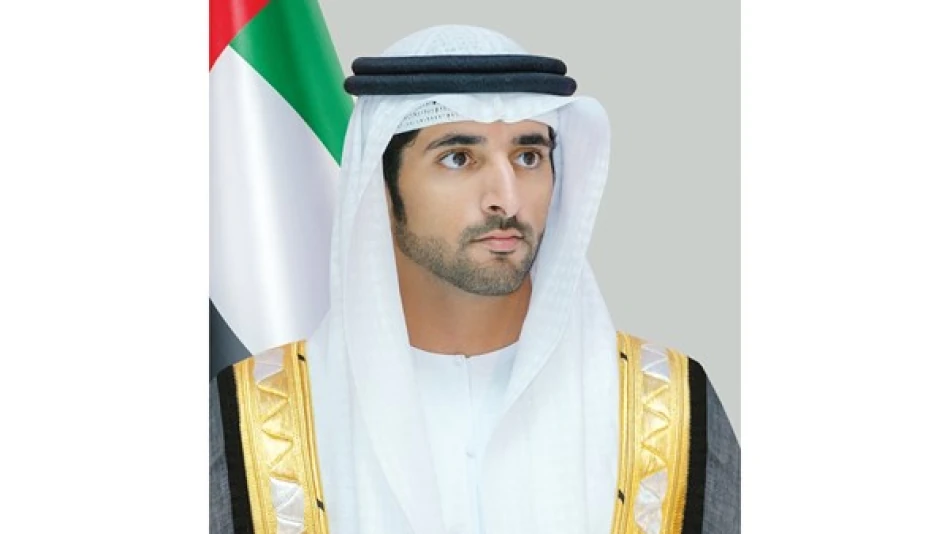
Crown Prince Approves First Global AI-Human Collaboration Transparency Index
Dubai Launches World's First AI-Human Collaboration Transparency Index
Dubai has unveiled the world's first classification system designed to enhance transparency around human-AI collaboration in research, publishing, and content creation. The initiative, approved by Crown Prince Sheikh Hamdan bin Mohammed bin Rashid Al Maktoum, positions Dubai as a pioneer in responsible AI governance while addressing growing concerns about undisclosed AI usage across academic and creative industries.
A Strategic Move Toward AI Accountability
The Dubai Future Foundation-developed classification system represents a significant step in the global conversation about AI transparency. As artificial intelligence becomes increasingly sophisticated and ubiquitous in content creation, the line between human and machine-generated work has blurred, creating challenges for academic integrity, intellectual property rights, and consumer trust.
Sheikh Hamdan emphasized that this initiative reinforces Dubai's leadership in establishing responsible innovation principles while promoting inclusivity by creating opportunities for all stakeholders. The Crown Prince called on researchers, content creators, and institutions worldwide to adopt this new classification system responsibly.
Addressing the AI Transparency Crisis
The Growing Need for Disclosure Standards
The timing of Dubai's initiative reflects mounting pressure across industries to address AI transparency gaps. Academic journals increasingly struggle with submissions that may contain AI-generated content without proper disclosure, while creative industries grapple with questions about authenticity and attribution. Recent controversies involving AI-generated academic papers and marketing content have highlighted the urgent need for standardized disclosure frameworks.
International Context and Comparisons
Dubai's move follows similar regulatory initiatives in other innovation hubs. The European Union's AI Act includes transparency requirements for AI systems, while Singapore has developed AI governance frameworks for financial services. However, Dubai's classification system appears to be the first comprehensive global standard specifically targeting human-AI collaboration transparency across multiple sectors.
This positions the emirate ahead of competitors like Hong Kong and Singapore in the race to become the premier AI governance hub for the Middle East and Asia-Pacific regions.
Market and Industry Implications
Impact on Academic and Publishing Sectors
The classification system could significantly impact academic publishing, where journals increasingly require authors to disclose AI usage. Publishers may adopt Dubai's framework as a global standard, potentially creating competitive advantages for institutions that implement comprehensive AI transparency measures early.
Commercial Content Creation
For marketing agencies, media companies, and content creators, the classification system may become a differentiating factor in client relationships. Organizations that can demonstrate transparent AI collaboration practices may gain competitive advantages in markets where authenticity and trust are paramount.
Dubai's Broader AI Strategy
This initiative aligns with Dubai's comprehensive AI strategy, which aims to make the emirate a global AI capital by 2030. The classification system complements existing initiatives like the Dubai AI Ethics Committee and the city's smart city transformation program. By establishing global standards for AI transparency, Dubai positions itself as both a technology adopter and a governance leader.
The move also supports Dubai's economic diversification goals by attracting AI-focused businesses and researchers who value clear regulatory frameworks. As companies increasingly seek jurisdictions with well-defined AI governance structures, Dubai's proactive approach may attract significant investment in AI research and development.
Implementation Challenges and Opportunities
While the classification system represents a significant step forward, its success will depend on widespread adoption and enforcement mechanisms. The voluntary nature of the initial rollout may limit immediate impact, but Dubai's influence in regional business networks could drive broader acceptance.
The system's effectiveness will also depend on its practical applicability across diverse industries and cultural contexts. As AI capabilities continue evolving rapidly, the classification framework must remain flexible enough to accommodate new forms of human-AI collaboration while maintaining clear transparency standards.
Most Viewed News

 Layla Al Mansoori
Layla Al Mansoori






